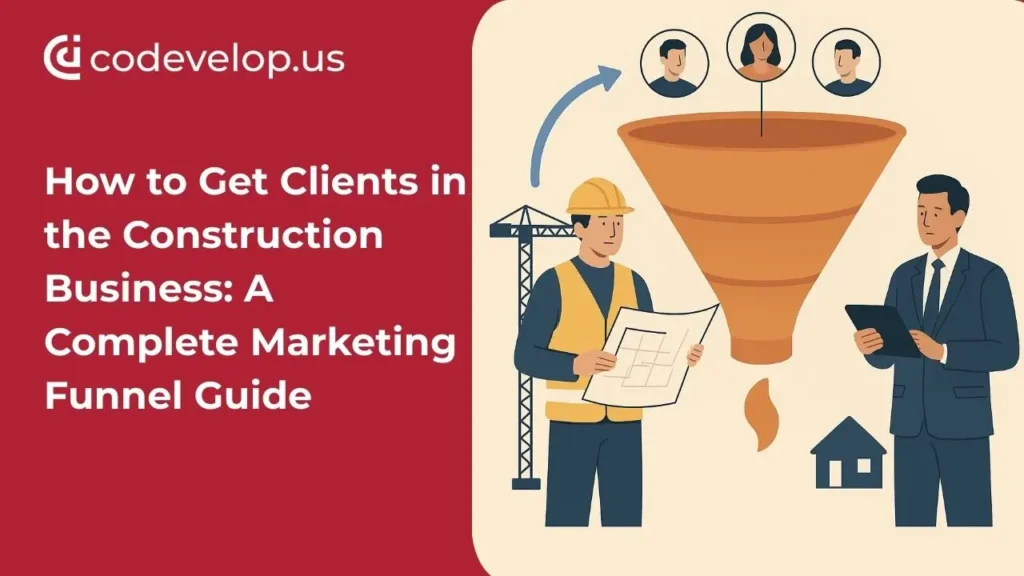Let’s be real: attracting clients in construction isn’t about posting an ad and hoping for calls. Construction projects are high stakes, relationships matter, and decision-makers don’t take chances. They want proof that you’re competent, reliable, and capable of handling their project from start to finish.
This guide walks construction companies through practical strategies to win clients, build trust, and create a repeatable marketing funnel that works. We’re talking residential remodels, commercial developments, and partnerships with architects and developers.
Know Your Clients: The Foundation of Your Marketing
Before throwing money at ads, know who you’re talking to. Construction clients fall into three major categories, each with unique expectations.
1. Commercial Property Owners & Developers
They care about:
- Meeting project deadlines
- Staying within budget
- Proven expertise
Scenario: Imagine a developer in Portland wants a contractor for a 12-unit apartment complex. They’ll ask for references, portfolios, timelines, and proof of insurance. If you can’t provide it clearly, they’ll hire someone else who can.
Tip: Share detailed case studies and before/after project photos. Highlight challenges and how your team solved them. This shows competence and builds trust.
2. Architects & Designers
These clients act as referral sources, too. They want:
- Reliability
- Ability to execute complex designs
- Clear communication
Scenario: An architect is designing a mid-rise office building. They need a contractor who can handle custom specifications and tight deadlines. By showing past projects with similar complexity, you become their preferred partner.
Tip: Attend networking events and industry meetups. Share your portfolio and demonstrate how you’ve solved problems on past projects.
3. Homeowners & Renovators
Smaller-scale clients care about:
- Transparent pricing
- Timeline clarity
- Trustworthy, licensed contractors
Scenario: A homeowner wants a kitchen remodel. They read online reviews, compare 3-4 contractors, and evaluate who communicates best and demonstrates expertise.
Tip: Offer free guides or checklists on your website. “Top 10 Questions to Ask Your Contractor” can turn a casual visitor into a lead.
4. Referrers & Influencers
Real estate agents, property managers, and relocation consultants are valuable sources of leads. They recommend contractors they trust.
Scenario: A relocation consultant recommends your services to a client moving into a new office space. Suddenly, you’re top of mind — before the client even searches online.
Stage 1: Awareness — Getting Found
No one can hire you if they don’t know you exist. Awareness is about visibility and credibility.
SEO That Actually Works
Most construction clients start online. Target high-intent, location-specific keywords:
- “Portland commercial contractor”
- “Residential remodeling near me”
- “General contractor for office buildouts”
Content matters. Blogs, project spotlights, and FAQ pages answer real client questions:
- “How to Check a Contractor’s Credentials”
- “Common Pitfalls in Commercial Renovations”
- “Budgeting for Your Home Remodel”
Our SEO services help construction companies rank locally, so clients find you when they’re ready to hire.
Paid Ads That Convert
Google Ads and Facebook Ads can work wonders — but only if targeted correctly. Focus on:
- Location-specific searches
- Project-specific terms (“commercial concrete contractor Portland”)
- Retargeting visitors who browsed services but didn’t contact you
Mini-example: A construction company ran Google Ads for “office renovation contractor Portland” and captured multiple developer leads within a month.
Content Marketing to Build Authority
Create content that positions you as the expert. Videos, blogs, downloadable guides, and social media posts can all educate and attract clients.
Check our content strategy for ways to create content that converts interest into leads.
Stage 2: Consideration — Prove You’re the Right Choice
Once a client finds you, they’ll compare you to other contractors. This is where many businesses lose leads.
Websites That Convert
Your website is your digital salesperson. Make sure it:
- List services clearly (residential, commercial, remodeling, specialty projects)
- Showcases completed projects with photos and testimonials
- Highlights licenses, insurance, and certifications
- Is mobile-friendly
Our web development services help turn visitors into inquiries. Don’t just tell clients you’re capable — show them.
Landing Pages & Lead Magnets
Generic homepages rarely convert. Offer valuable resources:
- Project checklist
- Budget estimator
- Guide to hiring contractors
Example: A landing page offering a free “Renovation Project Budget Planner” captured 50+ leads in a month.
Portfolio & Social Proof
Showcase completed projects with images, client testimonials, and before/after comparisons. Video testimonials or time-lapse project videos make your work tangible and trustworthy.
Stage 3: Conversion — From Interest to Contract
Turning leads into clients requires follow-up and personalization.
Email Nurturing
Most leads don’t hire immediately. Use automated email sequences:
- Day 1: Welcome and company overview
- Day 3: Project planning tips
- Day 5: Offer a free consultation or quote
Calls-to-Action
Every page should guide the visitor to act: request a quote, schedule a consultation, or download a guide. Keep forms short and mobile-friendly.
Sales & Marketing Alignment
Marketing and sales must communicate. Know what content leads are consumed, what pages they visited, and what questions they asked. Personalization increases conversion rates dramatically.
Stage 4: Retention & Referrals — Beyond the Project
Many construction businesses stop marketing once a project is done. This is a massive missed opportunity.
Follow-Up
Send thank-you emails, maintenance tips, or seasonal reminders. Stay on clients’ radar for future projects.
Referral Programs
Offer incentives for referrals — discounts on future projects, branded gifts, or service add-ons. Referrals are cheaper and convert better than cold leads.
Reputation Management
Online reviews drive trust and SEO. Respond promptly to both positive and negative feedback to demonstrate professionalism.
Local Marketing — Being a Trusted Community Partner
Offline marketing still matters:
- Attend local industry events
- Partner with architects and developers
- Sponsor trade shows or community projects
Tip: Share stories about completed local projects. Potential clients relate to success in their own neighborhoods.
Tracking, Analytics & Continuous Improvement
You can’t improve what you don’t measure. Track:
- Website traffic and form submissions
- Paid ad performance and conversions
- Social engagement and reviews
Test headlines, images, CTAs, and portfolio layouts. Small changes can dramatically improve lead capture.
Building a Construction Marketing Funnel That Works
Attracting clients in construction is about creating a repeatable funnel that guides prospects from awareness to signed contracts.
Funnel Overview:
- Awareness: SEO, ads, and content bring prospects to your site.
- Consideration: Landing pages, guides, portfolios, and social proof build trust
- Conversion: Email nurturing, calls-to-action, and sales follow-ups turn leads into contracts
- Retention & Referrals: Post-project follow-ups, referral programs, and reviews create repeat business
When you nail every stage, your leads stop being “leads” — they become loyal clients.
At Codevelop, we help construction companies design marketing funnels that attract high-value clients, convert efficiently, and build lasting credibility. With SEO, engaging content, high-converting websites, and integrated paid campaigns, your company can dominate your local market.


